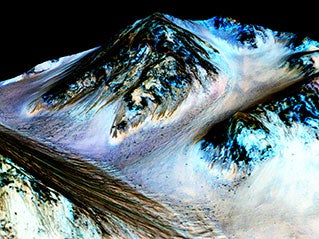Mars water: Why Nasa can’t just send a rover to check if there are aliens in the Red Planet’s brine
If present equipment were to head to the areas, they could end up dropping off alien life of our own — microbes from Earth

Nasa can’t send one of its rovers to check out the newly-discovered Mars water for fear of dropping off aliens of its own, the agency has said.
Scientists announced yesterday that they had found evidence of liquid water on the planet, a discovery that raises the chances of it supporting alien life. But we can’t send robots to check because we could drop off our own microbes, they have pointed out.
Nasa scientists pointed out in a Reddit Ask Me Anything session yesterday that the rovers also wouldn’t be able to actually get up to the regions that are being discussed. “These features are on steep slopes, so our present rovers would not be able to climb up to them,” scientists from Nasa’s Jet Propulsion Laboratory wrote.
But even if they could practically get there, scientists wouldn’t be able to send robots up.
“Because liquid water appears to be present, these regions are considered special regions where we have to take extra precautions to prevent contamination by earth life,” wrote Rich Zurek, the chief scientist at Nasa’s Mars Program Office. “Our current rovers have not been sterilized to the degree needed to go to an area where liquid water may be present.”
Those rovers have been aggressively sterilised all the same, the scientists pointed out. But that hasn’t been done to the right level for the areas that could potentially support alien life, and scientists don’t want to end up dropping our own microbes onto Mars and destroying the accuracy of their readings.
Some of those readings will inevitably be affected by the microbes that clung onto the rover as it left Earth. But they do take samples before they set off, which lets them compare any future discoveries with those that they know to have been on the rover when it left.
Subscribe to Independent Premium to bookmark this article
Want to bookmark your favourite articles and stories to read or reference later? Start your Independent Premium subscription today.

Join our commenting forum
Join thought-provoking conversations, follow other Independent readers and see their replies